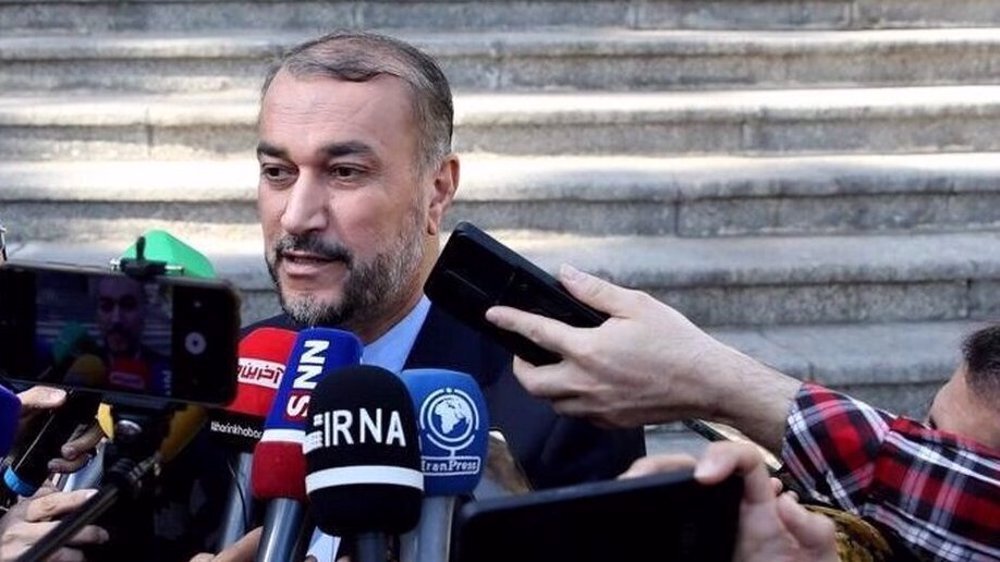FM says West implored Iran to lower severity of retaliatory attacks

TEHRAN- The foreign minister of Iran says that before Iran’s audacious attacks on Israeli-occupied territory last month in revenge for the regime’s lethal attack on the Iranian diplomatic post in Syria, the West had urged the Islamic Republic to use caution and lessen the severity of its reprisals.
On the sidelines of the Iranian administration’s weekly cabinet meeting on Wednesday, Hossein Amir Abdollahian added that “the request of the Westerners was that if you want to respond, do not hit hard and reduce the intensity of the operation.”
Addressing the reporters, the top Iranian diplomat continued that “ever since it was decided to conduct Operation True Promise, intensive contacts by the Westerners and the U.S.’s allies in Europe were established with Iran, and their first request was [for Iran] to exercise restraint and not to respond, to which we firmly stated that the response will definitely be given to the Israeli regime.”
“We did not allow any decisions to be made under pressure from others, but we told the Western and American side that the root [cause] is in the Gaza crisis that should be resolved and they should focus on that issue,” Amir Abdollahian said, emphasizing that the Islamic Republic made its own decisions about when and how to carry out the operation.
According to the senior diplomat, Iran has already informed the U.S. and the neighboring nations where Washington maintains facilities about the Islamic Republic of Iran’s planned retaliation attacks against Israel.
“We informed the U.S. side and the nations where the U.S. maintains bases two days prior to the operation that our targets are not the U.S. or its neighbors, but rather the Israeli regime,” Amir Abdollahian pointed out.
“In the notice, we warned that if the U.S. takes action against Iran’s interests, our response against the U.S. bases in the region will be immediate and decisive.”
Based on the remakes made by the Iranian foreign minister, Iran warned the neighboring nations that house U.S. occupation bases, saying, “Our relations are based on brotherhood but if the U.S. makes the slightest mistake, we will target American bases.”
The majority of the surrounding countries have informed us that they would not permit any nation to start an act of war against Iran from their territory, Amir Abdollahian continued.
The Iranian foreign minister mentioned the current state of affairs in the Gaza Strip elsewhere in his speech, stating that if the West keeps its word, the time is right for a lasting ceasefire in the beleaguered Palestinian enclave.
“We had an unwritten agreement with the Western parties to focus on the ceasefire in Gaza, and the Westerners said they would move in this direction and, today, positive signs have appeared in this regard.”
He also averred that in response to the proposal put out by Qatar and Egypt, the Palestinian resistance movement Hamas has responded “within the framework of its principles and as part of a realistic plan.”
“Everything is ready for the formation of a sustainable ceasefire and resolution of problems if the Americans and the West actually stick to the ceasefire and fulfill their promise,” he said.
Additionally, the senior Iranian diplomat issued a warning, underling that “if the war ends, a new Israeli crisis will break out in the occupied territories,” implying that Israeli Prime Minister Benjamin Netanyahu and hardliners in his regime want to keep the conflict going.
In a multi-pronged attack, dubbed Operation True Promise, the Iranian armed forces launched more than 300 drones and missiles at the occupied territories late on April 13 in response to the regime’s aggression on the Iranian diplomatic premises in the Syrian capital, Damascus, on April 1.
The Israeli airstrikes on Iran’s embassy compound in Damascus had targeted two generals of the Quds Force of the Islamic Revolution Guards Corps (IRGC), Brigadier General Mohammad Reza Zahedi and General Mohammad Hadi Haji Rahimi, as well as five of their accompanying officers.
